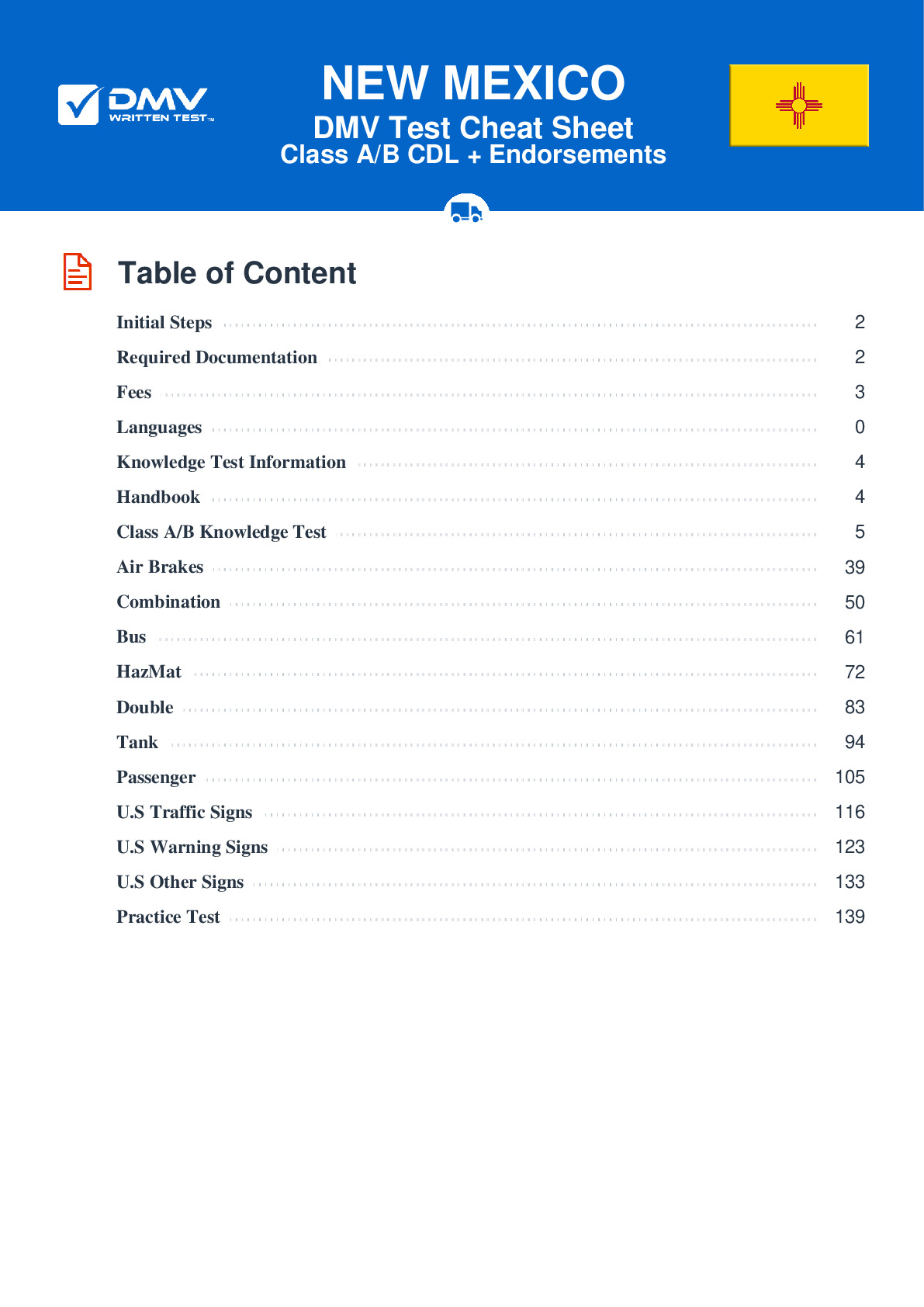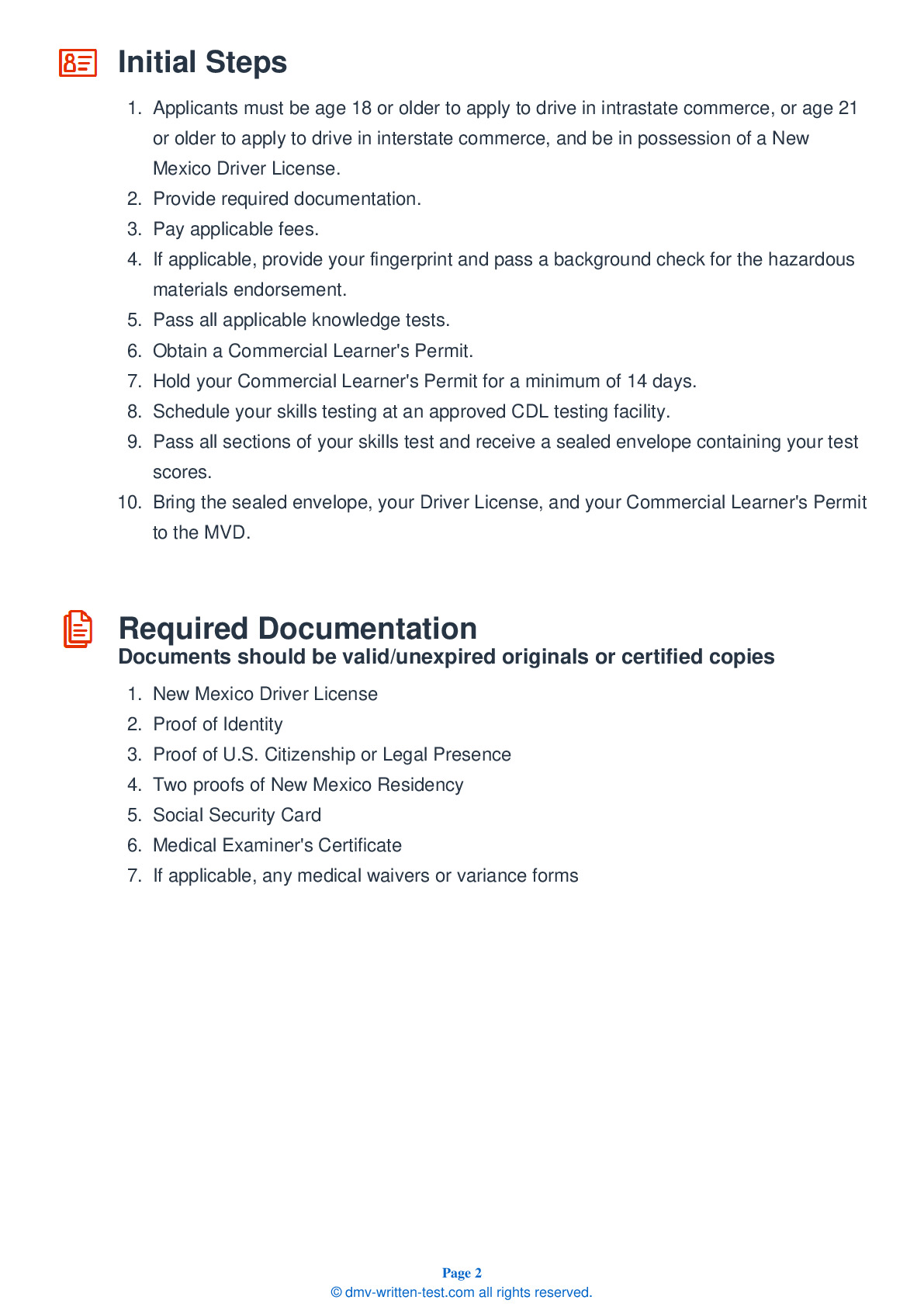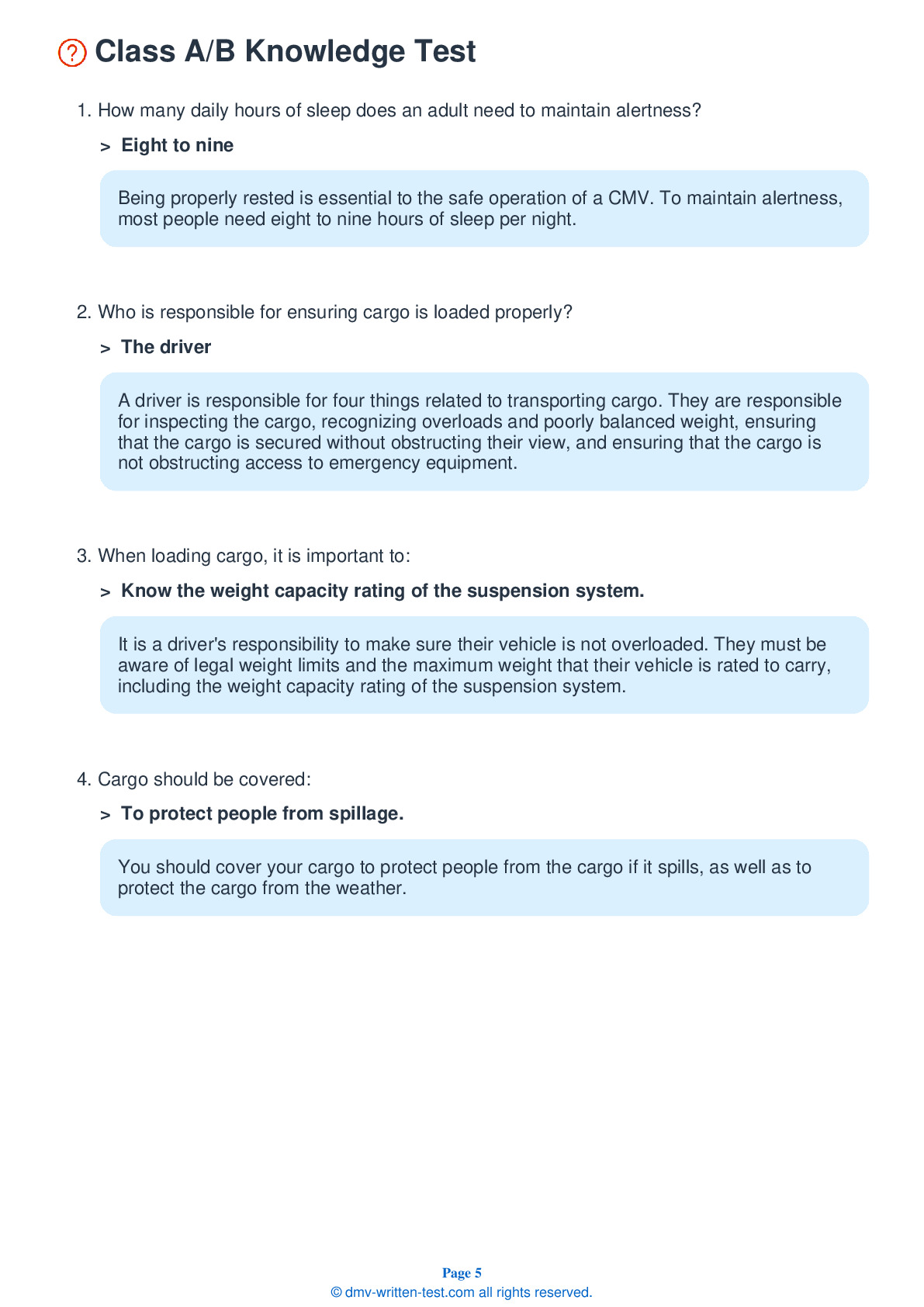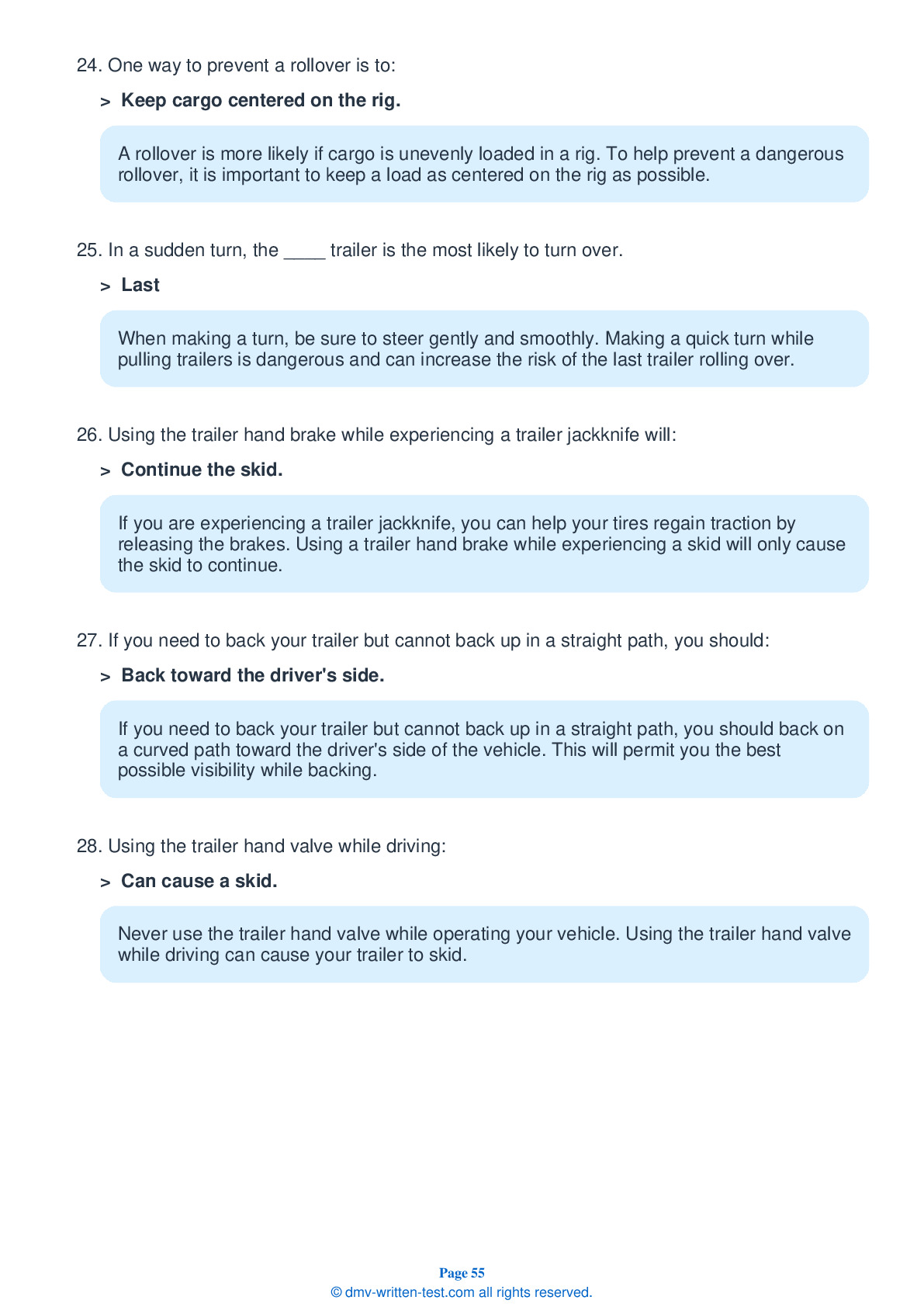Knowledge Test Class B
This license is required for driving a single vehicle with a GVWR of more than 26,001 pounds, and a trailer not to exceed 10,000 pounds gross vehicle weight rating, or a vehicle designed to transport 24 or more people (including the driver). To receive this license, applicants must pass a 50-question test. To pass, applicants must answer 40 questions correctly. Each question has three possible answer choices. Test questions come from the New Mexico Commercial Driver License Manual. Questions come from chapters covering: Introduction, Driving Safely, Transporting Cargo Safely, Air Brakes (if applicable), Pre-Trip Vehicle Inspection Test, Basic Vehicle Control Skills Test and On-Road Driving.. Endorsements that may be used with a Class B CDL are: Hazardous materials, Tank, Passenger, HazMat and Tank, Air Brakes and School bus.
8. If planning to change lanes, your mirrors should:
While regular mirror checks should be part of your normal scanning routine, be especially sure to check your mirrors when changing lanes.
9. When traction is poor, a driver should accelerate especially slowly:
You should accelerate very gradually when driving under slippery conditions. Using too much power in such conditions may cause you to lose control of your vehicle.
10. The center of gravity in a trailer should be:
The weight of cargo in a vehicle should be distributed as low as possible. Having a center of gravity that is too high will increase the risk of a rollover.
11. When approaching a construction worker who is near the road, you should:
Always drive with caution through work zones. You should make a particular point of reducing your speed when workers are on or near the roadway.
12. Hanging meat as cargo is:
An operator should drive with care when transporting a cargo of hanging meat. Such a load is unstable, both because it has a high center of gravity and because the swinging of the meat can affect the driver's handling of the vehicle.
13. To avoid a hazard, you:
Stopping is not always the best way to avoid a hazard. If there is not enough space for you to stop to avoid coming into contact with the hazard, swerving out of the way may be your safest option.
14. When starting an engine as part of a pre-trip inspection, the driver should:
Check your engine during the pre-trip inspection. After starting the engine, you should listen for unusual noises.
Frequently Asked Questions
Here are the steps to obtain a Class B CDL in New Mexico:
1. Obtain a New Mexico commercial driver's license manual and study it thoroughly.
2. Obtain a medical certificate from a certified medical examiner to ensure that you meet the physical requirements for driving a commercial vehicle.
3. Pass the written knowledge test at a New Mexico Motor Vehicle Division (MVD) office. You must answer at least 80% of the questions correctly to pass.
4. Schedule and pass a skills test with an approved third-party tester or at an MVD office. The skills test includes three parts: pre-trip inspection, basic vehicle control, and on-road driving.
5. Pay the appropriate fees and obtain your Class B CDL from the MVD.
It is important to note that additional endorsements may be required depending on the type of vehicle or cargo being transported.
1. A single vehicle with a gross vehicle weight rating (GVWR) of 26,001 pounds or more.
2. A combination of vehicles with a total weight of 26,001 pounds or less, where the towed unit has a GVWR of 10,000 pounds or less.
3. Vehicles designed to transport 16 or more passengers, including the driver.
4. Any size vehicle that requires hazardous material placards or is carrying materials listed as a select agent or toxin in 42 CFR part 73.
It is important to note that additional endorsements may be required depending on the type of vehicle or cargo being transported.
1. Be at least 18 years old (21 years old for interstate driving).
2. Hold a valid New Mexico driver's license.
3. Provide proof of identity, residency, and Social Security number.
4. Obtain a medical certificate from a certified medical examiner to ensure that you meet the physical requirements for driving a commercial vehicle.
5. Pass a written knowledge test that covers topics such as driving safety, transportation regulations, and vehicle operation.
6. Pass a skills test that includes three parts: pre-trip inspection, basic vehicle control, and on-road driving.
7. Pay the appropriate fees.
It is important to note that additional endorsements may be required depending on the type of vehicle or cargo being transported. Also, if you have any prior convictions or suspensions related to driving, you may be subject to additional requirements or restrictions when applying for a CDL.
If you plan to drive a commercial vehicle across state lines (interstate driving), you must be at least 21 years old to obtain a Class B CDL.
It is worth noting that some employers may have their own age requirements for commercial drivers, so it is always a good idea to check with potential employers before pursuing a CDL license.
There are several endorsements that you may need to obtain in addition to your Class B CDL, including:
1. Passenger (P) endorsement: required for drivers who will be transporting 16 or more passengers (including the driver) in a commercial vehicle.
2. School Bus (S) endorsement: required for drivers who will be operating a school bus.
3. Tank Vehicle (N) endorsement: required for drivers who will be transporting liquid or gaseous materials in bulk containers.
4. Hazardous Materials (H) endorsement: required for drivers who will be transporting hazardous materials.
5. Doubles/Triples (T) endorsement: required for drivers who will be towing two or three trailers at the same time.
To obtain an endorsement, you must pass a written knowledge test that covers the specific topic related to the endorsement and pay the appropriate fees. It is important to note that some endorsements have additional requirements, such as background checks and fingerprinting, depending on the type of cargo being transported.
1. Pre-Trip Inspection: In this part, you will be required to inspect your vehicle and ensure that it is safe to operate. You will be asked to identify and explain various components of the vehicle such as brakes, tires, lights, suspension, etc.
2. Basic Vehicle Control: In this part, you will be tested on your ability to control and maneuver the commercial vehicle in a controlled environment. You will be asked to perform various maneuvers such as straight line backing, alley docking, offset backing, parallel parking, and others.
3. On-Road Driving Test: In this part of the test, you will be required to drive on public roads while being evaluated on your ability to safely operate the commercial vehicle in real-life traffic situations.
During the entire test, you will be evaluated by a certified examiner who will assess your ability to safely operate a Class B commercial vehicle. You must pass all three parts of the skills test to obtain your Class B CDL.
1. Passenger Carrying Vehicles: Drivers with a Class B CDL may only operate vehicles designed to carry 16 or fewer passengers, including the driver.
2. Hazardous Materials: Drivers with a Class B CDL who transport hazardous materials must have the Hazardous Materials endorsement on their license.
3. Tank Vehicles: Drivers with a Class B CDL who operate tank vehicles must have the Tank Vehicle endorsement on their license.
4. Double and Triple Trailers: Drivers with a Class B CDL are not authorized to operate double or triple trailers.
5. Air Brakes: Drivers with a Class B CDL may not operate vehicles equipped with air brakes unless they have obtained the Air Brakes endorsement on their license.
6. Automatic Transmission: If a driver takes their skills test in a vehicle equipped with automatic transmission, their license will be restricted to only operating vehicles with automatic transmission.
It is important to note that these restrictions or limitations depend on the endorsements and skills test taken by the driver. It is recommended that drivers review their license and endorsements to understand any restrictions or limitations that may apply to them.
If you prefer to take the test in a language other than English, you should contact your local MVD office to confirm if they offer the test in the language of your choice. It is important to note that if you choose to take the test in a language other than English, you will be required to bring an interpreter with you during the skills test.
Additionally, it is important to note that the road signs and signals used during the skills test will be in English. Therefore, it is recommended that you have a good understanding of English to be able to interpret and understand these signs and signals while driving.
To request accommodations for the written test, you can contact the MVD Special Services Bureau by phone at (505) 383-2724 or by email at MVD.cdd@state.nm.us. You will be required to provide documentation of your disability, such as a doctor’s note or medical records, and specify the type of accommodation you need.
Some of the accommodations that may be available include extended testing time, a separate testing room, large print or Braille materials, and sign language interpreters. The MVD will review your request and determine the appropriate accommodations based on your individual needs.
It is important to note that requests for accommodations must be made in advance of the scheduled test date to allow adequate time for processing. Therefore, it is recommended that you contact the MVD as soon as possible to request accommodations for the written test.
It is important to note that if you fail the written test three times, you will be required to wait at least 30 days before retaking the test again. If you fail the test six times, you will be required to wait at least six months before retaking the test again.
To prepare for the Class B CDL written test, it is recommended that you study the New Mexico CDL Manual and take practice tests. You can access the manual and practice tests online or obtain a hard copy of the manual at your local Motor Vehicle Division (MVD) office.
It is important to prepare thoroughly for the written test because passing it is one of the first steps towards obtaining your Class B CDL.




